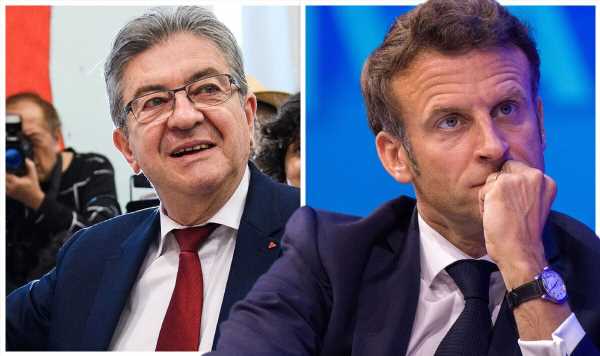Macron accused of 'lacking firmness' with Putin says expert
We use your sign-up to provide content in ways you’ve consented to and to improve our understanding of you. This may include adverts from us and 3rd parties based on our understanding. You can unsubscribe at any time. More info
French voters headed to the polls in the final and decisive round of this year’s presidential elections, as centrist re-elect Emmanual Macron attempts to hold onto the majority amid potential threats from a new left alliance. Emmanuel Macron won a second term of presidency in April but today’s vote will determine the balance of power in the National Assembly.
Mr Macron needs a majority for his centrist party grouping in the lower house of parliament in order to push through his reforms with ease.
But in order to keep his majority, Mr Macron needs to win 289 seats. Although, this could be seen as a stretch while voting turnout remains at a record low.
Pollsters predict that Macron’s centrist alliance, Ensemble, will be the biggest grouping in parliament.
However, it could fall short of winning the majority, bearing the risk it may have to form a coalition with political opponents.

Based on last Sunday’s first round of results, polling institute Ipsos predict Mr Macron’s Ensemble coalition would garner 255 to 295 seats, while 150 to 190 fall in the hands of left-wing alliance NUPES, led by Jean-Luc Melenchon.
If this goes ahead, Mr Macron could face years of legislative gridlock in the National Assembly.
Initial projections are expected at 6pm, but here are three reasons Mr Macron should be worried.
Loss of support
In the time between the first round of April’s presidential election and the first round of the parliamentary election last Sunday, Mr Macron has lost nearly four million voters in absolute numbers.

This has largely been due to historically low abstention rates.
While Mr Melenchon’s NUPES alliance gathered fewer votes than its individual candidates did separately in the first presidential election, polls have shown this left-wing party has largely funnelled supporters from Melenchon to boost its positioning.
They’ve also managed to attract votes from the more moderate left-leaning candidates, such as Yannick Jadot from the Greens and Socialist Anne Hidalgo according to data from polling institute Harris Interactive.
The same data shows Mr Macron has lost approximately nine percent of voters from the first round to France’s right-leaning party, Les Républicains.
Macron’s primary focus on war
Mr Macron hasn’t done too much in the way of campaigning and instead, has primarily focused on the eastern conflict instead.

This doesn’t bode too well when French citizens are most concerned about health care and spiralling living costs.
Foreign policy appears to have moved down the list of priorities for French voters compared to polling data in April. And with the President placing this item ahead of others in the agenda, voters may opt for a party that sings more to their tune.
The President’s visit to Romania and Moldova next week instead of focusing on electioneering underpins this.
However, one of Mr Macron’s advisors countered this, telling Politico: “It’s fieldwork for a responsible president.
“Mélenchon’s weak point is precisely Europe and his relationship with Russia.”
Young voters
Sunday’s vote reflected that younger voters prefer left-leaning Melenchon to the incumbent president.
Melenchon cast himself as the young disruptor in the political landscape and his policies tend to appeal more to younger voters.
However, polls also show young voters are most like to abstain. This could work in Mr Macron’s favour in the short term, while older voters are more likely to vote for him instead.
But long-term, lack of youth support won’t bode too well for future successes.
Source: Read Full Article





